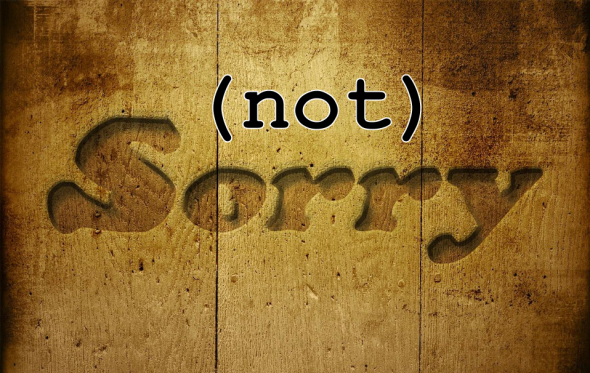This week’s 14-tweet “apology, of sorts” from Uber’s Travis Kalanick is the latest reminder of public figures’ unhappy habit of putting their foot in it. It’s a familiar news cycle intensified by social media, which can focus attention on a story and sustain pressure on its players until the cycle of anger forces a public apology—too often reluctant or insincere.
Writing in 2012 about the nature of apologies, I said that being sorry is about more than just saying the words, “but the words, as an explicit admission of wrongdoing or shortcoming, can be an important part of reconciliation.” With a non-apology the aims and effects are wholly different. The person delivering it can move on, professing the matter dealt with—a routine step in self-mythologizing narratives—but recipients of the unapology feel continued frustration, even disgust, at the failure to accept responsibility.
When guilty people aren’t really sorry (or are worried about the legal implications), they don’t want to make a direct, unqualified admission. This is not a definitive science: Someone might say “I’m very sorry for what I did” and not mean it, or apologize tortuously but with heartfelt intent. Nevertheless, non-apologies tend to ring conspicuously false, being variously couched in ifs, buts, hedges, deflection, qualification, self-absorption, euphemism, defensiveness, obfuscation, and the agentless passive voice (“Mistakes were made”). I’m just sorry I got called out is a common subtext.
Only loosely or ironically can utterances like these be called apologies. So other words have emerged to occupy the semantic niche: non-apology, nonpology, notpology, nopology, fauxpology, unapology, unpology, pseudo-apology, if apology, false apology (also fake, hollow, conditional apology, etc.), the past exonerative, sorry not sorry (a wry tag popular on social media), and non-apology apology, which, though long-winded, is popular enough to have its own Wikipedia page. Hyphen styles vary.
Non-apologies are phrased in bad faith in a way that minimizes accountability. The aim is not to atone but to reduce damage to the person’s image. Repentance is feigned or ignored, contrition held at arm’s length. Non-apologizers, far from showing empathy with those hurt, are more likely to implicitly blame them for getting upset, manufacturing offense, or interpreting the incident in a way that reflects badly on the wrongdoer. Here are a few examples from the annals of non-apologies:
I am sorry that statements taken out of context have had such repercussions. (Francisco Javier León de la Riva)
Our cover illustration last week got strong reactions, which we regret. […] Our intention was not to incite or offend. (Josh Tyrangiel)
If anything I said this morning has been misconstrued to the opposite effect I want to apologize for that misconstrued misconstruction. (Joe Barton)
I feel bad if her feelings were hurt. (Questlove)
Given the usefulness of the idea of an inept or insincere apology, and the lack of a standard term for it, it’s no surprise there is a growing array of informal coinages. They’re not all interchangeable: “I’m sorry if you were offended” is an if apology, but without the if it isn’t. Each of the terms listed above has some currency—Google and you’ll find them, and others, in use. But none has yet been adopted in sufficient numbers to become the general default.
Of course, we could avoid the whole question of whether to call it a nopology or an unpology if people would just give sincere apologies all the time. According to Professor Aaron Lazare, author of On Apology, the difference between a genuine expression of remorse and a mealy-mouthed fauxpology designed to get someone’s conscience off the hook comes down to acknowledging the offense clearly, explaining it effectively, restoring the offended parties’ dignity, assuring them they’re safe from a repeat offense, expressing shame and humility, which show understanding of their suffering, and making appropriate reparation, among other things.
Tough, right? That’s why a real apology makes us immediately respect the wrongdoer more, regardless of our broader feelings about the issue. But, well, I initially set out to write about non-apologies without knowing what current example I was going to lead with, and it took just two days after finishing the first draft for Uber’s CEO to rise to the challenge, so I don’t think the era of pseudo-apologies is ending any time soon.
Follow @lexiconvalley on Twitter or on Facebook.
